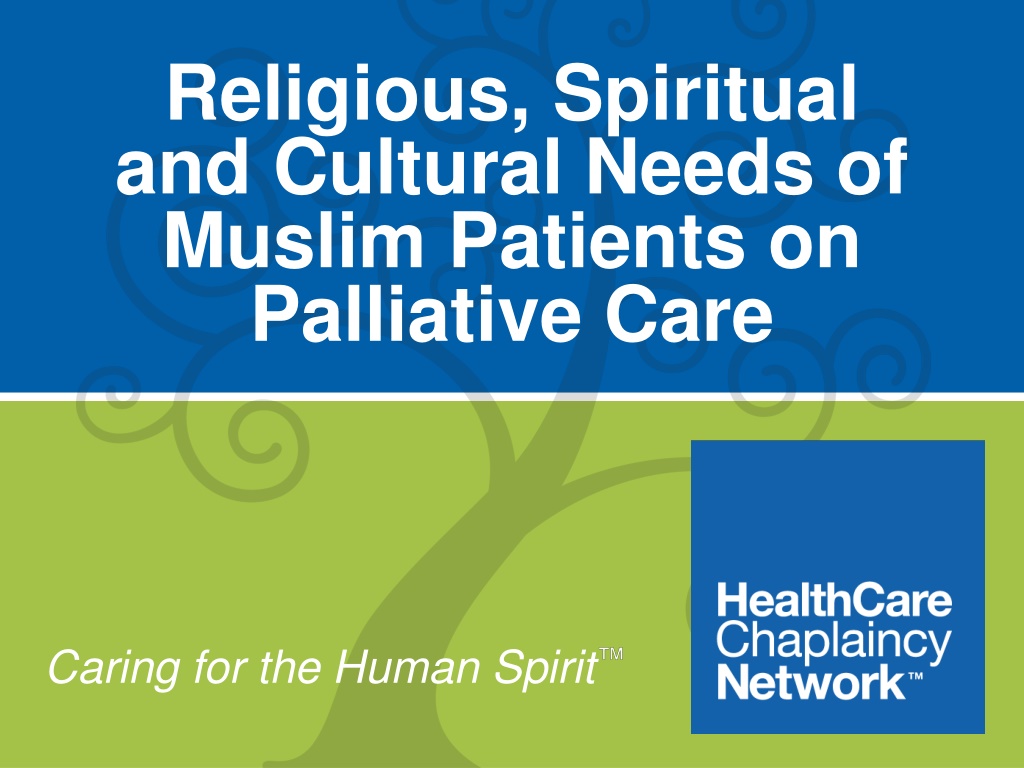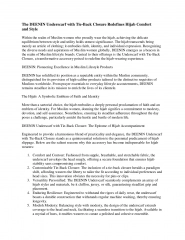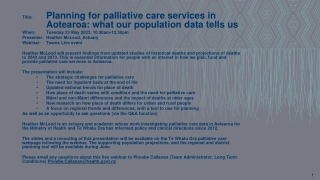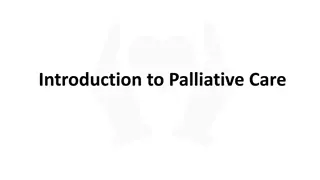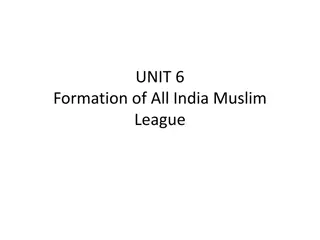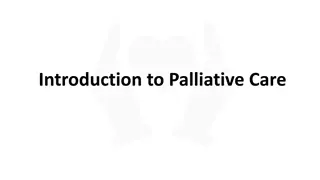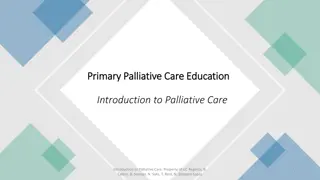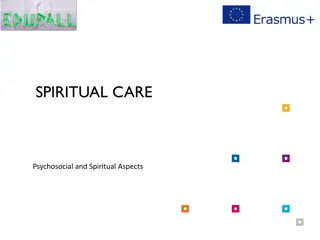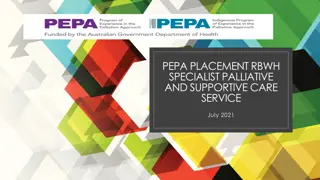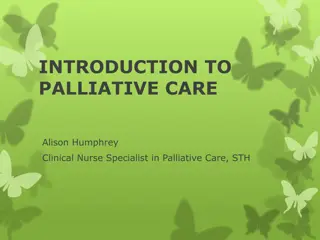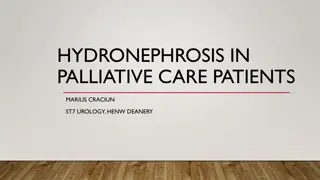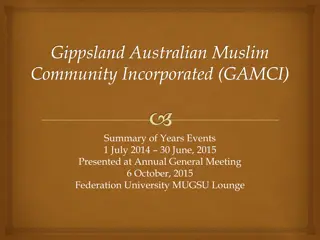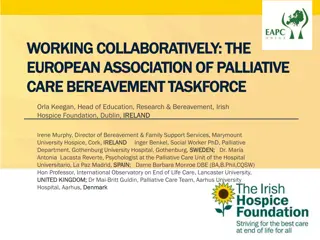Muslim Patients' Palliative Care: Addressing Religious and Cultural Needs
Religious, spiritual, and cultural needs of Muslim patients on palliative care is crucial for providing holistic care. This includes exploring the Five Basic Principles of Islam such as Shahadah, Salat, Zakat, Sawm, and Hajj, which form the foundation of the Islamic faith. Knowledge of these principles helps healthcare providers cater to the unique needs of Muslim patients during their end-of-life journey.
Download Presentation

Please find below an Image/Link to download the presentation.
The content on the website is provided AS IS for your information and personal use only. It may not be sold, licensed, or shared on other websites without obtaining consent from the author. Download presentation by click this link. If you encounter any issues during the download, it is possible that the publisher has removed the file from their server.
E N D
Presentation Transcript
Religious, Spiritual and Cultural Needs of Muslim Patients on Palliative Care Caring for the Human Spirit
Religious, Spiritual and Cultural Needs of Muslim Patients on Palliative Care Speaker: Al-Hajji Imam Yusuf H. Hasan, BCC HealthCare Chaplaincy Network- Clinical Staff Winthrop University Hospital- Chaplain in Spiritual Care
The Five Basic Principles of Islam In Islam, every action performed in the obedience to G-D s guidance is considered an act of worship. However, it is the specific acts of worship called the Principles of Islam and the Articles of Faith that provide the basic framework. The Five Basic Principles are as followed
1. SHAHADAH Declaration of Faith To testify that there is no G-D but Allah and that Muhammad is the Messenger of Allah This is the first principle of Islam that one must declare and believe in as a Muslim. It is this statement that formally brings a person into Islam and is the bedrock of the Islamic Faith.
2. SALAT Prayer/Worship Establish regular prayer, for at a fixed times have been enjoyed on the believers. Prayer is the second principle of Islam and Muslims must perform five times daily.
3. ZAKAT Charitable Contributions Those which in charity spend of their goods by night and by day. In secret and in public, have their rewards with their Lord: On them shall be no fear, nor shall they grieve. Zakat is the third principal of Islam, which is paid once a year based on personal savings at the rate of two and a half percent.
4. SAWM Fasting In Islam, Muslims worldwide participate in the annual month long fast called Ramadhan. Fasting is the fourth principle of Islam, and it is one of the great institutions in Islam designed to cultivate human excellence within the individual.
5. HAJJ Pilgrimage to Mecca Muslims are required to perform Hajj once in a lifetime if they can afford it and in good health. The fifth and last principle of Islam, which completes the foundation of Islam.
THE ARTICLES OF FAITH (BELIEFS) 1. Belief in Oneness of G-D 2. Belief in the Angels 3. Belief in the Books (All the Revealed Scriptures) 4. Belief in the Prophets (All of Them) 5. Belief in the Hereafter 6. Belief in Judgment 7. Belief in Measurement of Good and Evil
DAILY PRACTICES Engage in Prayer Five Times a Day Before Prayer Ritual Washing called Wudu or Cleansing
HOLY DAYS & FESTIVALS The Most Holiest Day for the Muslim is Jum ah Prayer (Congressional Prayer); it is held every Friday and takes the place of the noon prayer Eid-ul-Fitr (Feast of the Fast Breaking) Eid-ul-Adha (Feast of the Sacrifice)
FOOD Muslims are required to eat Halal meat for health reasons Tayyib Halal: means what is good, pure, clean, wholesome, nourishing and pleasing to taste. Halal is the way the animal is raised, slaughtered and prepared by Muslims under the supervision of an Imam (Religious Leader) Muslims are forbidden to eat pork, unless driven by necessity
HEALTH There is no restriction on blood or blood products, medications, amputations, organ transplant or donation and biopsies Most surgical procedures are permitted Life support is an individual choice A fetus is considered a living human being after 25 week gestation
DYING AND DEATH Chapter 36 call Ya-Sin is usually recited to the sick and dying Euthanasia or any attempt to shorten life is prohibited The first principle of Islam is recited by the dying Embalming and cremation is prohibited After death Muslims wash and shroud the deceased Janazah Prayer is recited in Arabic prior to burial
FACILITATING PRACTICES Explore what practice is most important to the Patient/Family Some culture/customs prohibit handshakes or any contact between genders Female patients may want a female physician Some culture/customs may require you to speak to the male first Be aware of language barriers
SAYINGS OF THE PROPHET (PBUH) From the Book Of Patients, The Prophet said: No fatigue, no disease, nor distress befalls a Muslim, even if it were the prick he receives from a thorn, but that G-D expiates some of his sins for that. (7:547-O.B) If G-D wants to do good to somebody, He afflicts them with trials. (7:549-O.B) None of you should wish for death because of a calamity befalling him, but if he has to wish for death, he should say: O G-D! Keep me alive as long as life is better for me, and let me die if death is better for me. (7:575-O.B)
COMMON WORDS TO KNOW WHEN WORKING WITH MUSLIM PATIENTS & FAMILIES 1. Abee 2. Akika 3. Allah 4. Al-Islam 5. As Salaam mu Alaikum 6. Eid u-Fitr 7. Eid U-Adha 8. Hajj 9. Holy Quran 10. Imam 1. Father 2. Ceremony for the newborn 3. God in Arabic 4. The Religion of Peace 5. Peace be unto you 6. Feast of Fast-Breaking 7. Feast of Sacrifice 8. Pilgrimage to Mecca 9. Book that should be read 10. Prayer Leader 11. Iman 12. Jum ah 13. Janaza 14. Masjid 15. Muslim 16. Muslima 17. Ummi 18. Prophet Muhammed Ibn Abullah 19. Ramadhan 20. Salat 21. Sawn 22. Wa Alaikum As Salaam 23. Zakat 11. Faith 12. Friday Congregation Prayer Service 13. Funeral Prayer Service 14. House of Worship 15. The Male Believer 16. The Female Believer 17. Mother 18. The Last Prophet of Allah 19. Month of Fasting 20. Prayer 21. Fasting 22. And unto you be peace 23. Charity
PROPHET MUHAMMEDS LAST SERMON O People, it is true that you have certain rights with regard to your women, but they also have rights over you. Remember that you have taken them as your wives only under Allah s trust and with His permission. Do treat your women well and be kind to them for they are your partners and committed helpers. And it is your right that they do not make friends with any one of whom you do not approve, as well as never to be unchaste. O People, listen to me in earnest, worship Allah, say your five daily prayers (Salah), fast during the month of Ramadhan, and give your wealth in Zakat. Perform Hajj if you can afford it.
PROPHET MUHAMMEDS LAST SERMON All mankind is from Adam and Eve, an Arab has no superiority over a non-Arab nor a non-Arab has any superiority over an Arab; also a white has nor superiority over black nor a black has any superiority over white except by piety and good actions. Learn that every Muslim is a brother to every Muslim and that the Muslims constitute one brotherhood. Nothing shall be legitimate to a Muslim which belongs to a fellow Muslim unless it was giving freely and willingly. Do not therefore, do injustice to yourselves. Remember, one day you will appear before Allah and answer for your deeds. So beware, do not stray from the path of righteousness after I am gone.
PROPHET MUHAMMEDS LAST SERMON Beware of Satan, for the safety of your religion. He has lost all hope that he will ever be able to lead you astray in big things, so beware of following him in small things. All those who listen to me shall pass on my words to others and those to others again: and may the last ones understand my words better than those who listen to me directly. Be my witness O ALLAH, that I have conveyed your message to your people.
SPIRITUAL CARE CASE STUDIES IN PALLIATIVE CARE 1. 13 Year Old Girl with Bone Cancer- Christian Faith 1. 80 Year Old Woman with Face Tumor- Catholic Faith 1. 14 Year Old Boy with Tumor- Muslim Faith
QUESTION & ANSWER Q & A When illness and trauma strikes the whole family is sent on a journey it never asked to take. As a Chaplain my responsibility is to walk with the person and his or her loved ones, helping all of them make the difficult journey from despair to hope even if the outcome isn t favorable. I am also there to uplift, to gently lead and sometimes follow, so that everyone affected can make the transition from hopeless to hopeful. ~Imam Yusuf Hasan, BCC
